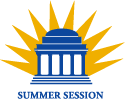Summer Session 2001
ClassicsDEPARTMENTAL CONTACT: Ms. Gerry Visco, 617C Hamilton
Telephone: 854-7821
E-mail: [email protected] Language courses are not open to auditors. Greek–AncientGreek S1121D. Intensive elementary course.
E. Ahtaridis. 4 points. MTuWTh 4–6:05. May 21–June
29 and June 1
Noncredit option available.
Equivalent to Greek V1101 and V1102.
Covers all of Greek grammar and syntax in one term to prepare the student to
enter Greek V1201 or V1202. This is an intensive course with substantial preparation
time outside of class. Greek S1201Q. Intermediate: prose.
S. Martinez. 4 points. MTuWTh 4–6:05. July 2–August
10 and July 6
Noncredit option available.
Prerequisite: Greek V1121 or Greek V1101-V1102, or the equivalent.
Selections from Attic prose. Greek–ModernModern Greek S1121E. Intensive elementary modern Greek.
May 21–July 20A. Kalyvas. 4 points. TuWTh 5–7 p.m.
Noncredit option available.
Equivalent to Modern Greek V1101 and V1102. Covers all of Greek grammar and
syntax in one term to prepare the student to enter Modern Greek V1201, with
emphasis on both speaking and writing. Incorporates Greek culture and cross-cultural
analysis; cultural field trips and audio-visual material will supplement the
study of the language. This is an intensive course with substantial preparation
outside of class. Latin Latin S1121D. Intensive elementary course.
Z. Várhelyi. 4 points. MTuWTh 6:15–8:20 p.m. May
21–June 29 and June 1
Noncredit option available.
Equivalent to Latin V1101 and V1102.
Covers all of Latin grammar and syntax in one term to prepare the student to
enter Latin V1201 or V1202. This is an intensive course with substantial preparation
time outside of class. Latin S1221Q. Intensive intermediate course.
B. DeSmidt. 4 points. MTuWTh 6:15-8:20 p.m. July 2–August
10 and July 6
Noncredit option available.
Equivalent to Latin V1201 and V1202.
Prerequisite:Latin V1121 or V1101–1102 or the equivalent. Reading of selected Latin prose and poetry with a review of grammar in one
term to prepare the student to enter third-year Latin. This is an intensive
course with substantial preparation time outside of class. Classical CivilizationClassical Civilization courses will be given in translation: no knowledge of
Latin or Greek is required. Classical Civilization S3166D. Greek political theory.
E. Scharffenberger. 3 points. TuTh 5:30–8:40 p.m. May 21–June
29
Open to auditors.
Examination of the genesis and development of Greek political theory, beginning
with its earliest expressions in poetic texts of the archaic period and culminating
in the exegeses of Plato and Aristotle. The links between political ideas, theories
about individual ethical development, religious beliefs, and metaphysical speculations
will be analyzed. Tragedies, comedies, histories, court-speeches, and expository
writings will be used as source material. The legacy of political theories developed
by the Greeks and how they were used as the justification for political movements
will also be covered. Classical Civilization S3180D. Performance of narrative: ancient Greek dance,
music, and drama.
J. Fogel and K. Boerger. 3 points. TuTh 6–8 p.m. May 21–June
29
Open to auditors.
Introduction to the basic principles of ancient Greek "classical"
theory and practice of performance, with emphasis on dance, music, and drama.
Bards and singers, rap, civil rights songs, women’s choruses, traditional
narrative poetry, group musical dance performances, poetry of Sappho, and the
interpretation of classical Greek drama over the centuries will be covered.
Classical LiteratureClassical Literature courses will be given in translation: no knowledge of
Latin or Greek is required. Classical Literature S3220D. Homer’s world: the poetics of ethnography
and civilization.
B. King. 3 points. MW 5:30–8:40 p.m. May 21–June 29
and June 1
Open to auditors.
Close reading of Homer’s Iliad and Odyssey. Examination of the epics utilizing
research in comparative epic and poetics; social anthropology; archaeology;
ancient ideas of the function of poetry; and contemporary literary criticism.
Poets both ancient and modern (e.g., Derek Walcott, Louise Glück) who have
responded to and reimagined Homer’s poems will be read and discussed. Classical Literature S3233Q. Ovid: love, politics, and literature in
the age of Augustus.
V. Yeh. 3 points. MW 5:30–8:40 p.m. July 2–August 10 and
July 6
Open to auditors.
Ovid’s Metamorphoses, The Art of Love, and his other major works will be
read in translation. Emphasis on Ovid’s resistance to and ironic commentary
on political and social culture under the emperor Augustus, who sent him into
exile, allegedly because of the eroticism of his "teachings." Later
critical and creative responses in Renaissance and post-Renaissance literature
will be assessed. Classical Literature S3310Q Classical mythology.
Z. Pappas. 3 points. TuTh 5:30-8:40 p.m.July 2–August 10
Open to auditors.
All readings in English. Introduction to major Greek myths and their variations.
Topics will include stories about Oedipus, King of Thebes, Jason and the Golden
Fleece, Helen and the sack of Troy, and a selection of myths concerning invasions
and population migrations in the lore of the past. Beginning with early Greek
epic poetry, texts from the Classical and Hellenistic periods. Readings include
Homer, Hesiod, Pindar, Aeschylus, Sophocles, Euripides, with excerpts from Herodotus,
Thucydides, Diodorus of Sicily, Apollodorus of Athens, and Apollonius of Rhodes.
Noncredit Language CoursesCertain language courses may be taken on a noncredit basis for $1,100 each,
plus any course fees noted in the departmental listing. Students taking noncredit courses are held to the same standards as regular
students with regard to:
- attendance
- class participation
- completion of homework assignments
- any other course requirements.
Noncredit students who fail to meet these requirements may be asked to leave
the course. Under no circumstance are these courses convertible to credit, except payment
in full for the credit option before the designated last day to exercise the
pass/fail option. No qualitative grade(s) are assigned or recorded. Students are assigned the
mark of R (registration) for the courses they complete; a University transcript
bearing that mark may be issued at the student's request. Call numbers for these courses (needed for registration) will be available
after April 3.
|

